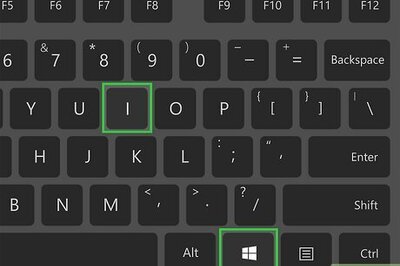
views
La Paz, (Bolivia): Bolivians go to the polls on Sunday to choose their fourth leader in just over two years. Street protests over the country's economic policies forced two leaders from office during that time.
The outgoing President on Saturday said Bolivia's presidential election, in which a Leftist US critic is favored to win, was a test for democracy in South America's poorest country.
"Bolivians have gone through a series of crises and we are putting our democratic system to test, that test will continue after the elections," President Eduardo Rodriguez said.
The new President will succeed Rodriguez, a caretaker President who took over in June after his predecessor, Carlos Mesa, resigned amid Indian-led demonstrations demanding the nationalization of Bolivia's gas industry.
Opinion polls show Evo Morales, a Leftist Indian congressman and US critic, holding a narrow lead over his leading opponent, Jorge Quiroga, a conservative former President.
Neither is expected to get the 51 per cent needed to avoid a congressional vote in January between the two top vote getters.
If he wins, Morales would become Bolivia's first indigenous President and add this country to the leftward political tilt rippling across South America.
Deep divisions
About 50,000 police and soldiers will be deployed across the country for Sunday's balloting. Some 200 international observers, many from the Organisation of American States, will also be on hand to monitor the vote.
The new President will face the daunting task of trying to bridge a deep divide in this country of 9.4 million, plagued by social tensions between an Indian majority gaining political power and the traditional white and mixed-race business class.
Other challenges include calls for autonomy from the country's wealthiest regions, and determining how to move forward in developing Bolivia's rich natural gas fields, the focus of protests in recent years.
PAGE_BREAK
Polls show some 10 per cent of voters remain undecided.
In the wealthy southern La Paz suburbs, Javier Pacheco, a 34-year-old architect, said he hadn't yet made up his mind on whom to vote for.
"It's a historic process because (Evo) is the first indigenous candidate to be ahead in an election. But his ideas are too radical for a developing country," he said.
Morales, an Aymara Indian who has built his campaign on challenging US influence in the region, has promised to nationalize Bolivia's gas industry and legalize the growing of coca leaf, the plant that is the key ingredient to make cocaine.
The move could undermine American anti-drug efforts in the world's third-biggest cocaine producer.
On Thursday, the US State Department said the US would evaluate its relations with Bolivia after the election.
State Department spokesman Sean McCormack said Washington had long supported the current Bolivian government's counter-narcotics policy and hoped a new government would have the same approach.
Polls show Morales faring strongly in areas with large indigenous populations like La Paz and his stronghold, Cochabamba, in the central part of the country.
A US-educated engineer, Quiroga leads in regions like Santa Cruz, Bolivia's largest city, and the southern region of Tarija, where Indian populations are smaller.
Voters say they are drawn to his pledges to keep Bolivia on a free-market track.
















Comments
0 comment